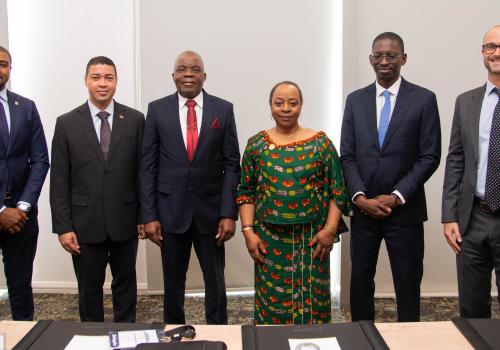The SADC Business Council (SADC BC) held the First Southern African Industrialisation Forum from 26th to 27th February 2024 at the l in Johannesburg, Republic of South Africa. The SADC Business Council is a regional apex body for the SADC private sector. It represents national and regional business associations fromSADC Member States. The SADC BC is the prime public sector partner forging the SADC development and integration agenda.
The Southern African Development Community (SADC) Deputy Executive Secretary for Regional Integration Ms Angele Makombo N’Tumba delivered the opening remarks and hailed SADC Business Council for organising the forum for business leaders to discuss industrial priorities and investment opportunities in the region.
Ms. Makombo N’Tumba said the objectives of the forum are well aligned to the SADC regional industrialisation and development agenda, encapsulated in the SADC Vision 2050 and the Regional Indicative Strategic Development Plan (RISDP 2020-2030), which are the strategic documents for SADC regional integration and development.
Mr. Ousmane Fall, Director of Non-Sovereign Operations and Private Sector at the African Development Bank, reiterated the Bank’s commitment to scale up its support to the regional industrialisation agenda and assist Member States in recovering from the recent economic shocks as they strengthen their industrial development. He said that for the period spanning 2016-2020, the Bank invested USD 10.3 billion under the Industrialise Africa High 5 priority, and the subsequent approvals reached USD 2.1 billion in 2022.
He reckoned that the Bank’s regional integration strategy for Southern Africa identifies two mutually reinforcing priority areas: infrastructure connectivity and market integration and industrialisation. On infrastructure connectivity, he said, the Bank will construct and rehabilitate strategic regional infrastructure that promotes trade, industrialisation, and structural transformation. Regarding market integration and industrialisation will support capacity development, encourage policy reforms to expand trade, help harmonise financial markets, and foster monetary cooperation to facilitate investments, Mr. Fall said.
The two-day event brought together top government and business leaders who deliberated on the Southern African region’s industrial priorities and investment opportunities. The Forum addressed critical topics such as human capital development, trade and investment facilitation, infrastructure development, and high-potential sectors, including automotive, pharmaceuticals, tourism, renewable energy, transport and logistics.

